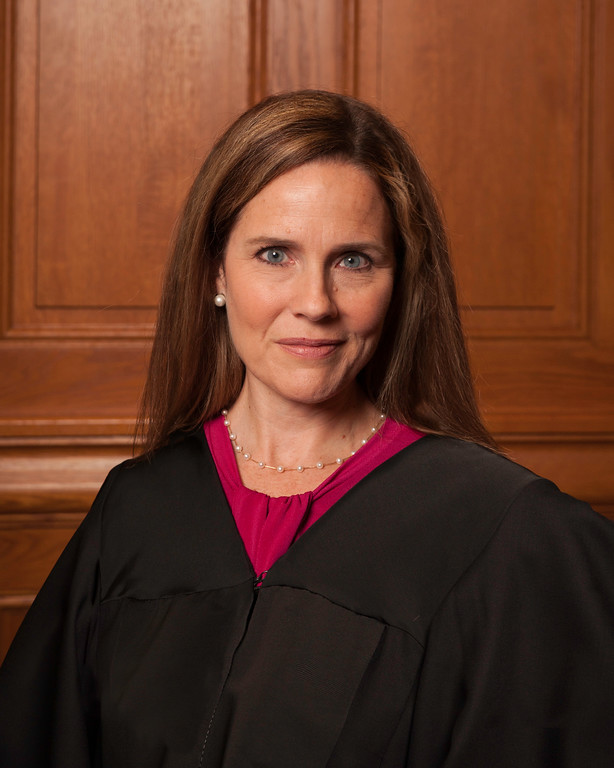Amy Coney Barrett, 48, has been under heavy controversy since her appointment to the Supreme Court. Her views and interpretations of the law will be put to the test once she is approved by the Senate. (Photo courtesy of Wikimedia Commons)
In the sweltering June heat, the Supreme Court made a historical court decision — the 14th amendment requires a state to liscense a marriage between same sex couples. After being denied that right for decades, the LGBT+ community rejoiced. Sadly, that joy is short-lived, as a new threat to equal marriage rights is being sworn into the court as we speak.
The Newcomer
After Ruth Bader Ginseburg’s death, who held strong liberal views, Trump was quick to announce the next judge who will take her place. Amy Coney Barrett, a devout Catholic and Notre Dame graduate, is a favorite among conservatives and right-leaning party voters.
“Ginsburg maintained one of the most consistent liberal voting records in the history of the court. Barrett has the same consistency and commitment,”
Jonathan Turley
This sudden change in extremes will tip the scales on divisive court decisions. Obamacare, equal marriage, abortion, Second Amendment disputes, and other matters are all on the table. As Barrett moves through the Senate approval process, many left-leaning politicians grow uneasy, afraid that precedents set by previous cases will be overturned.
Obergefell vs. Hodges: The Precedent
It’s hard to imagine that the right to marry whomever would be so divisive, but the 2015 decision split hairs, with Obergefell barely winning 5-4. Justices Scalia, Roberts, Thomas, and Alito all voted in favor of religious discrimination — claiming these marriages can be denied under the First Amendment. Scalia’s dissent (an official statement made to dispute the final result of a case) claimed that it should be up to individual states to legalize same sex marriages, and the courts should have never been involved.
Here’s the biggest concern — Scalia is Barrett’s mentor, and she shares his views.
The two are “originalists”: judges who interpret the Constitution how the original authors would see fit. While it sounds nice in theory, it excludes all modernization and growth that happened in the US by sticking old views on the 21st century. Coupled with her “textualist” views, Barrett sticks to what is written on paper, with no room for interpretation.
Agreeing with Scalia’s dissent, Barrett believes that state legislatures have the authority to grant or deny same sex marriages, not the court; she views these denials as religious freedoms protected under the First Amendment.
Joining the Pack
Barrett isn’t the only justice to back up Scalia and Co.’s dissents — Justices Clarence Thomas and Samuel Alito made their voices clear on the subject on October 6. A case involving a marriage clerk in Kentucky denying a same sex marriage was dismissed. That’s not the issue though, even though the court could have easily ruled against the clerk (due to the 2015 precedent). The concern comes from what the justices said after the hearing.
“In Obergefell v. Hodges, 576 U. S. 644 (2015), the Court read a right to same-sex marriage into the Fourteenth Amendment, even though that right is found nowhere in the text. Several Members of the Court noted that the Court’s decision would threaten the religious liberty of the many Americans who believe that marriage is a sacred institution between one man and one woman. If the States had been allowed to resolve this question through legislation, they could have included accommodations for those who hold these religious beliefs. Id., at 711 (ROBERTS, C. J., dissenting); id., at 734 (THOMAS, J., dissenting). The Court, however, bypassed that democratic process. Worse still, though it briefly acknowledged that those with sincerely held religious objections to same-sex marriage are often ‘decent and honorable,’ id., at 672, the Court went on to suggest that those beliefs espoused a bigoted worldview”
Official statement by Justice Thomas
Along with claiming the 2015 decision wasn’t decided diplomatically, they went to defend the clerk’s decision as her “religious right” to deny a marriage license. The dissenters attack the landmark decision, stating it allowed “‘governments, employers, and schools’ to ‘vilify’ those with these religious beliefs ‘as bigots’,” even going as far as to say the clerk had to make “ a choice between her religious beliefs and her job.” They blame Obergefell for her troubles, claiming it didn’t allow her to voice her religious freedoms — going directly against the 1st amendment.
What to Expect
Barrett’s record doesn’t fare well for the LGBT+ community. She’s purposefully misgendered transgender Americans, and defended the dissenters of the Obergefell v. Hodges case. She poses a threat to most minorities with her conservative views. Women’s reproductive rights, discrimination disputes, and more are hot topics Barrett will face.
Let’s be honest: The future looks pretty grim for the LGBT+ community. At the end of the day, nobody knows how Barrett will handle these heated debates. As the election draws closer, there’s even more uncertainty, which will throw even more chaos in the mix.
The air is electric with tension, a revolution ready to explode. Maybe I’ll see you on the front lines.

Hi! My name is Ellie and I’m a senior editor, trending editor, and print editor for The Mycenaean. I am also a second degree blackbelt at Triangle’s best karate, floral assistant, and a self-proclaimed starving artist. Just a chaotic libra whose only personality trait is how often she dyes her own hair

Leave a Reply